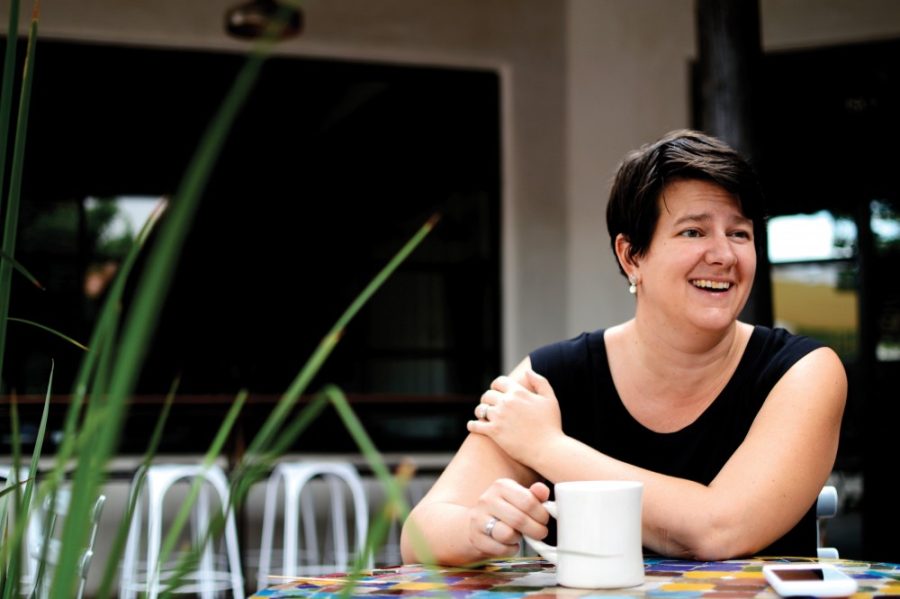UA Ph.D. graduate and former lecturer Eva Romero is co-directing a documentary that will celebrate women and raise awareness for women’s rights in Paraguay.
Romero, a Paraguay native, who is co-directing the documentary “Kuña,” began furthering her knowledge of women’s studies and film while at the UA.
“When I went on to my Ph.D., I started looking into visual culture,” Romero said. “I started getting more into film and I ended up writing my dissertation on the film of Paraguay.”
Romero said she also took classes on women’s studies and completed her dissertation titled, “Film and Democracy in Paraguay,” which the publishing company Palgrave Macmillan has agreed to publish soon.
During her travel for her Ph.D., Romero said she met many film directors—her co-director, Ramiro Gómez, being one of them.
“Ramiro and I, we’re on the same page and we care a lot about women’s issues and representation of women,” Romero said.
She said their discussions about Paraguay led them to comment on problems they saw on an Amnesty International campaign against domestic abuse. She said further talks with the organization allowed them to get funding for this documentary idea.
RELATED: Meet the Pride of Arizona’s new director, Chad Shoopman
Romero and Gomez’s team is also seeking additional support through their Kickstarter to make sure additional costs are taken care of. They are close to their goal of raising $10,000.
Romero said that no amount is too small to donate and believes the documentary supports a worthy cause.
“I think it’s a great opportunity for anybody to give a little philanthropic donation,” Romero said. “And I feel competent that it’s probably going to impact millions of women in some ripple way.”
Their documentary will highlight Paraguayan women, who make up 74 percent of the labor force, according to a USAID website. In Paraguay, women were only granted the right to vote in 1961 and the ability to divorce in 1991. Women still do not have equal protection from domestic abuse and abortion remains illegal nation-wide, according to the Amnesty International website.
Romero, who was born in the U.S. but moved back to Paraguay at the age 8 for 10 years, said that being raised in this type of environment was hard.
“I think that it’s really intense to be raised in that environment because it just seems normal to you,” Romero said. “It wasn’t really until I got out of that environment and started studying feminism and finding out, ‘ok, that’s not normal.’”
She added that it was the men who acquired important roles in Paraguay, but now it is important women don’t let this same mindset continue on to younger generations.
RELATED: UA prof and poker rookie Mitch Towner wins Monster Stack in Vegas
Their crew will only interview women for the documentary, which Romero said is is one of the causes for the provisional title, “Kuña,” which means “woman.”
“One of our real main focuses is that we want to listen to the women we’re interviewing,” Romero said. “This is the first time where there’s a media project that says, ‘Hey women, you’re important, this is solely dedicated to you.’”
This week, Romero will begin interviewing these women from a compiled list of over 100. Although she said they won’t interview everyone, her team will do the best they can to include every women’s voice.
Waiting for her return to the U.S. will be Andrew Haberbosch, Romero’s husband who said he not only supports and shares these same ideals, but will be a role-model for their young daughter.
Haberbosch, who considers himself a feminist, created the documentary teaser video.
“If you just look for all things Paraguay, more often than not you won’t see things that are very positive,” he said. “I think even the teaser video highlights challenges that Paraguay has, including gender inequality.”
Haberbosch said this documentary is something many people relate to and support.
“The approach that has been described to me by Eva, who’s co-directing, is that it’s actually going to highlight a lot of positive things about female role models in Paraguay,” Haberbosch said. “I think that’s something a lot of people can get behind.”
Romero believes that change will come in the future for Paraguay and the women within.
“I think that the future is bright,” Romero said. “If we have a little patience, we’re going to see a lot of things change in our lifetimes.”
Follow Shaq Davis on Twitter.








